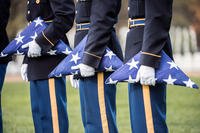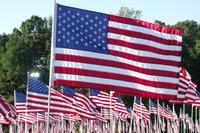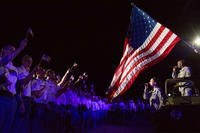The U.S. Flag Code is not legally enforceable, but adherence to it is considered a sign of patriotism and respect. The code formalizes and unifies the traditional ways in which we give respect to the U.S. flag, and also gives specific instructions on how the flag is not to be used.
By following these guidelines, individuals and organizations show respect for the American flag and the values it represents.
Questions and Answers About Showing Respect for the U.S. Flag
When should the American flag be displayed?
- Answer: The U.S. flag should be displayed from sunrise to sunset. It can be displayed 24 hours a day if properly illuminated during darkness.
How should the U.S. flag be displayed when hung vertically or horizontally on a wall?
- Answer: When hung vertically, the union (blue field with stars) should be at the top and to the U.S. flag's own right (the observer's left). When hung horizontally, the union should be at the top and to the observer’s left.
How should the U.S. flag be raised and lowered?
- Answer: The U.S. flag should be hoisted briskly and lowered ceremoniously.

What is the proper way to display the U.S. flag on a vehicle?
- Answer: The U.S. flag should be fixed firmly to the chassis or clamped to the right fender.
Can the U.S. flag be used as drapery or a covering?
- Answer: No, the U.S. flag should not be used as drapery or covering. It should not be used as bedding or draped over a vehicle.
What is the protocol for flying the U.S. flag at half-staff?
- Answer: The U.S. flag should first be hoisted to the peak for an instant and then lowered to the half-staff position. Before lowering for the day, it should be raised to the peak again.
What should be done if the U.S. flag touches the ground?
- Answer: The U.S. flag should be handled with respect and should not touch the ground. If it does, it should be cleaned and cared for properly.
How should the U.S. flag be displayed in a procession or parade?
- Answer: The U.S. flag should be either on the marching right (the U.S. flag’s own right) or at the front center of a line of other flags.
How should individuals show respect when the U.S. flag passes by in a parade or is being raised or lowered?
- Answer: All persons should face the U.S. flag, stand at attention, and salute. Those in uniform should give the military salute. Members of the armed forces not in uniform and veterans may render the military salute in the manner provided for persons in uniform. Others should remove any headdress with their right hand and hold it at the left shoulder, hand over the heart. Men without hats should salute by placing the right hand over the heart.
Can the U.S. flag be used for advertising purposes?
- Answer: No, the U.S. flag should not be used for advertising purposes or printed on items intended to be discarded after temporary use.
How should a flag be disposed of when it is no longer fit for display?
- Answer: The U.S. flag should be retired in a dignified manner, preferably by burning.

Can the U.S. flag be worn as clothing?
- Answer: No, the U.S. flag should not be used as apparel. However, a flag patch can be affixed to the uniform of military personnel, firemen, policemen, and members of patriotic organizations.
What is the proper way to display the U.S. flag with other flags on the same staff?
- Answer: The U.S. flag should always be at the top, above any other flag on the same staff.
Do’s and Don’ts for the American Flag
To summarize, the following is a list of do’s and don’ts associated with Old Glory, the U.S. Flag.
When displaying the U.S. flag, DO the following:
- Display the U.S. flag from sunrise to sunset on buildings and stationary flagstaffs in the open. When a patriotic effect is desired the U.S. flag may be displayed 24-hours a day if properly illuminated during the hours of darkness.
- When placed on a single staff or lanyard, place the U.S. flag above all other flags.
- When flags are displayed in a row, the U.S. flag goes to the observer’s left. Flags of other nations are flown at the same height. State and local flags are traditionally flown lower.
- When used during a marching ceremony or parade with other flags, the U.S. flag will be to the observer’s left.
- On special days, the U.S. flag may be flown at half-staff. On Memorial Day it is flown at half-staff until noon and then raised.
- When flown at half-staff, it should be first hoisted to the peak for an instant and then lowered to the half-staff position. The U.S. flag should be again raised to the peak before it is lowered for the day. By "half-staff" is meant lowering the U.S. flag to one-half the distance between the top and bottom of the staff.
- When the U.S. flag is displayed over the middle of the street, it should be suspended vertically with the union (blue field of stars) to the north in an east and west street or to the east in a north and south street.
- When placed on a podium the U.S. flag should be placed on the speaker’s right or the staging area. Other flags should be placed to the left.
- When displayed either horizontally or vertically against a wall (or other flat surface), the union (blue field of stars) should be uppermost and to the U.S. flag's own right, that is, to the observer's left.
- When displayed in a window it should be displayed in the same way -- with the union or blue field to the left of the observer in the street.
- When the U.S. flag is displayed on a car, the staff shall be fixed firmly to the chassis or clamped to the right fender.
- When the U.S. flag is used to cover a casket, it should be so placed that the union is at the head and over the left shoulder. The U.S. flag should not be lowered into the grave or allowed to touch the ground.

When saluting the U.S. flag DO the following:
- All persons present in uniform (military, police, fire, etc.) should render the military salute. Members of the armed forces and veterans who are present but not in uniform may render the military salute.
- All other persons present should face the U.S. flag and stand at attention with their right hand over the heart, or if applicable, remove their headdress with their right hand and hold it at the left shoulder, the hand being over the heart.
When stowing or disposing of the U.S. flag, DO the following:
- Fold in the traditional triangle for stowage, never wadded up. The U.S. flag should be folded in its customary manner.
- When disposing of a U.S. flag by burning, it is important that the fire be fairly large and of sufficient intensity to ensure complete burning of the flag.
- Place the U.S. flag on the fire.
- The individual(s) can come to attention, salute the U.S. flag, recite the Pledge of Allegiance and have a brief period of silent reflection.
- After the U.S. flag is completely consumed, the fire should then be safely extinguished and the ashes buried.
- Please make sure you are conforming to local/state fire codes or ordinances.
Quick List of Flag Etiquette Don’ts:
- Don’t dip the U.S. flag for any person, flag, or vessel.
- Don’t let the U.S. flag touch the ground.
- Don’t fly the flag upside down unless there is an emergency.
- Don’t carry the U.S. flag flat, or carry things in it.
- Don’t use the U.S. flag as clothing.
- Don’t store the U.S. flag where it can get dirty.
- Don’t use it as a cover.
- Don’t fasten it or tie it back. Always allow it to fall free.
- Don’t draw on or otherwise mark the U.S. flag.
- Don’t use the U.S. flag for decoration. Use bunting with the blue on top, then white, then red.
Stay on Top of Your Military Benefits
Military benefits are always changing. Keep up with everything from pay to health care by subscribing to Military.com, and get access to up-to-date pay charts and more with all latest benefits delivered straight to your inbox.















